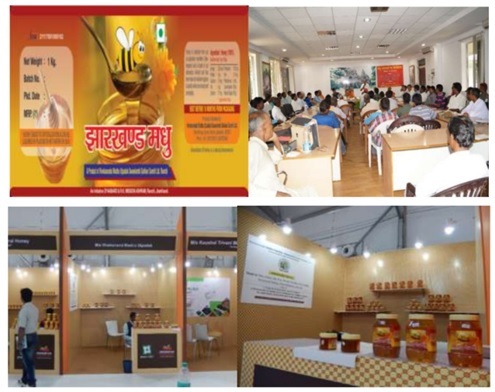Beekeeping in Jharkhand has empowered the local farmers
Details:
Italian bee (Apis mellifera) keeping as a livelihood option was introduced by the Ramakrishna Mission Divyayan Krishi Vigyan Kendra (KVK) in the early 1990’s as a modern and scientific way of honey production apart from the traditional way of honey collection. It was a time when farmers didn't believe in the success of Italian beekeeping. They have also never heard of beekeeping of Indian species. For honey and other products, they were solely dependent on DESI (Indian hive bees or Rock bees) bee colonies in forests or in their village from where they used to harvest raw honey. However, as a result of training and motivation, few farmers turned up and showed their interest in beekeeping. After a lot of motivation from scientists of Divyayan Krishi Vigyan Kendra, 1-2 farmer(s) of Obar village started this beekeeping activity with 2-3 bee boxes. After years of relentless and continuous effort, the passion of the farmers of Obar village made commercial beekeeping a success in their area, and thereafter few more years of continuous effort done by both Ramakrishna Mission Ashrama, Ranchi and Farmers, European or Italian beekeeping turned out to be a game-changer not only in the Obar village but also in the whole block of Angara in Ranchi.
The beekeeper’s group flourished as an unorganized group and later on 30 June 2016 a legal entity “Vivekanand Madhu Utpadak Swawlambi Sahakari Samiti Limited” was formed under the technical guidance of Divyayan KVK and was linked with NABARD for financial support/assistance initially with 341 members. The group is directed towards the training of the farmers on commercial beekeeping, assisting farmers in various day to day needs, supporting farmers in migration of bee boxes through the formation of various subgroups, creating market linkage of honey with traders/companies within the state and outside the state and negotiation with traders/company for the best price of honey.
Pahlu Bedia, a recipient of the National Youth Award (on 12th January in 2000), is an active member of VSS (Vivekananda Seva Sangh, an Ex-trainee’s Organization of Divyayan, Ramakrishna Mission Ashrama, Ranchi) of the village (Obar). The 44-years-old played an active role and took an extra effort in constituting a new group of honey growers in his village through community mobilization, motivating farmers to attend meetings and training, bee box distribution among farmers, information sharing, awareness creation among farmers and consequently formed a group ‘Jharkhand Prakritik Madhu Utpadan Company, Obar’ with Bank of India in 2021.
Vivekanand Madhu Utpadak Swawlambi Sahakari Samiti Limited, Ranchi is about five years old. The FPO covers 86 clusters for honey-growing farmers. FPO members collect honey from different plants like Karanj, Litchi, Niger, Mustard, Vantulsi, Mangrosa, Ber, etc. The group formally started in the year 2016-17 with 341 members with an annual turnover of Rs. 5.42 lakh and gradually increasing its member as well as the annual turnover of up to Rs. 70.46 lakh. Presently, the FPO has 510 member farmers. Vivekanand Madhu Utpadak Swawlambi Sahakari Samiti Limited, Ranchi markets its product under the brand of JHARKHAND MADHU in 250 g to 1 kg pack with FSSAI License.
The formation of FPO resulted in a significant increment in farmers’ income by around 25-30 percent. Presently, a total of 2500-3000 farmers have been trained in beekeeping with the help of this group and a total of 4000-5000 Italian bee boxes with colonies have been distributed to farmers of different villages in convergence with various government schemes and departments like Khadi Gram, Mukhyamantri Laghu Kutir Udyog, NABARD, etc.
Principal Investigator: Dr. Avijit Kr. Dutta,Assistant Professor, Ramakrishna Mission Vivekananda Educational and Research Institute, ARTD Faculty Centre, Ranchi
Contact info: avijitkumardutta@gmail.com
Implementing Agency: Ramakrishna Mission Vivekananda Educational and Research Institute, ARTD Faculty Centre, Ranchi
Funding Agency: Department of Science and Technology (DST)
